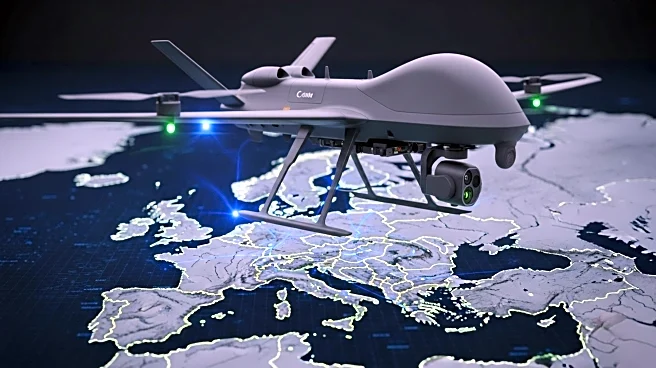What's Happening?
Denmark's Prime Minister Mette Frederiksen has issued a stark warning about the threat of a hybrid war from Russia, urging European nations to rearm and prepare for potential conflict. This warning comes in the wake of Russian drones invading NATO airspace, which experts believe is a tactic to test the bloc's defenses. Frederiksen emphasized the need for Europe to innovate and enhance its military capabilities, particularly in drone technology, to counteract these threats. The European Union is considering measures to fend off Russian aggression by 2030, with intelligence reports suggesting Russia could mount an assault in Europe within three to five years. Discussions among EU nations have included the creation of a 'drone wall' to protect against unmanned aerial vehicle (UAV) incursions.
Why It's Important?
The warning from Denmark's Prime Minister highlights the escalating tensions between Europe and Russia, underscoring the need for increased military preparedness. The potential for a hybrid war poses significant risks to European security and stability, necessitating a coordinated response from EU member states. The proposed 'drone wall' could serve as a critical defense mechanism, safeguarding European airspace from Russian UAVs. This development could lead to increased defense spending and technological advancements in military capabilities across Europe. The situation also has broader implications for NATO, as the alliance may need to reassess its strategies and resources to address the evolving threat landscape.
What's Next?
European nations are likely to continue discussions on enhancing their military capabilities and implementing the 'drone wall' project. The EU may also explore diplomatic avenues to mitigate tensions with Russia, while simultaneously strengthening its defense posture. NATO's involvement could increase, with potential adjustments to its defense strategies and resource allocation. The situation may prompt further intelligence sharing and collaboration among EU member states to effectively counter Russian aggression. Additionally, the Kremlin's response to these developments will be closely monitored, as it could influence future diplomatic and military interactions between Russia and Europe.
Beyond the Headlines
The concept of a 'drone wall' raises ethical and legal questions regarding surveillance and airspace control. The implementation of such a defense system could lead to debates about privacy and the balance between security and civil liberties. Furthermore, the increased militarization of Europe may have long-term implications for regional stability and international relations. The situation also highlights the importance of technological innovation in modern warfare, as nations seek to develop advanced systems to counter emerging threats. The evolving dynamics between Russia and Europe could reshape geopolitical alliances and influence global power structures.









